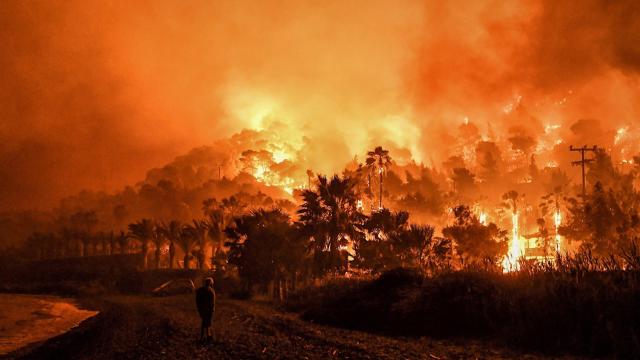Greece has suffered through a summer of hellish heat. Now, experts want to give heat waves names and rankings like the ones assigned to hurricanes and tropical storms.
Heat is often called a “silent killer” because while it doesn’t cause the same visible destruction that storms, tornadoes, or fires do, it is one of the deadliest forms of extreme weather in the world.
“Unlike other adverse weather events, you can’t see extreme heat,” Kostas Lagouvardos, research director at the National Observatory of Athens, told the Guardian’s sister newspaper the Observer. He said policymakers and the public need to be aware of the quiet dangers heat poses, and that naming heat waves could be a way to do just that.
“We believe people will be more prepared to face an upcoming weather event when the event has a name,” he said. “They’ll become more aware of the possible problems it could cause to their lives and to their properties.”
The need has become startlingly clear this month. Punishing temperatures in Greece have crushed records, climbing well into the triple digits as the nation bakes through its second major heat wave since June. In the central region of Phthiotis, the National Observatory of Athens recorded the country’s highest temperature since record-keeping began, at 115 degrees Fahrenheit (46 degrees Celsius). The nation’s prime minister called the heat wave “the greatest ecological catastrophe of the last few decades.”
The extreme heat has sucked the moisture out of vegetation, sparking dozens of destructive wildfires that scorched more than 250,000 acres. The blazes forced thousands to evacuate, killed three, and left hundreds homeless. Two fires are still burning just outside of the capital city of Athens. But even absent wildfires, oppressive heat is also devastating in less visible ways, increasing the risk of heat-related illnesses like heat exhaustion and heatstroke.
While heat may be a silent killer, it is the clearest impact of the climate crisis. A major United Nations climate report published earlier this month found climate change has already doubled the odds of heat waves, and the risk will only increase in the coming decades. That points to the urgent need for adaptation, and naming heat waves could be one way to help people grasp the risks they pose.
Lagouvardos’ proposal is that any heat wave with temperatures forecast to be above 104 degrees Fahrenheit (40 degrees Celsius) for more than a week should be named and categorised. He added that this process could be more challenging for heat than typhoons or winter storms because a ranking scale would have to include assessments of factors like temperature distribution and population densities. But in other ways, it could be easier. Compared with storms, heat waves are easier to predict in severity and length.
Global climate science and medical experts have long advocated for severe heat waves to have names and rankings. Last year, some researchers, city governments, and nonprofit organisations even formed the Extreme Heat Resilience Alliance, an initiative created with this express purpose.
If Greece acts on these recommendations, it will be the first nation in the world to do so. Last month, Athens became the first city in Europe to appoint a chief heat officer to find ways for the city to adapt to oppressive temperatures. The appointee, Eleni Myrivili, told the Observer she would support naming heat waves, too.
“The whole idea of making heat waves more visible by naming and categorising them in terms of severity would be a turning point,” she said.
